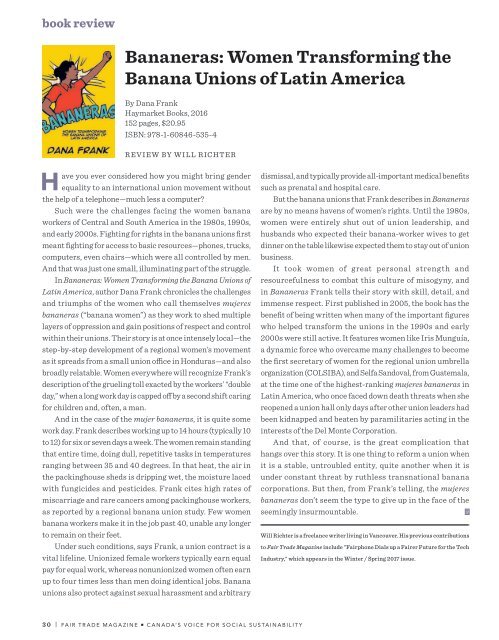FTM-July2017-Issuu
You also want an ePaper? Increase the reach of your titles
YUMPU automatically turns print PDFs into web optimized ePapers that Google loves.
ook review<br />
Bananeras: Women Transforming the<br />
Banana Unions of Latin America<br />
By Dana Frank<br />
Haymarket Books, 2016<br />
152 pages, $20.95<br />
ISBN: 978-1-60846-535-4<br />
REVIEW BY WILL RICHTER<br />
Have you ever considered how you might bring gender<br />
equality to an international union movement without<br />
the help of a telephone—much less a computer?<br />
Such were the challenges facing the women banana<br />
workers of Central and South America in the 1980s, 1990s,<br />
and early 2000s. Fighting for rights in the banana unions first<br />
meant fighting for access to basic resources—phones, trucks,<br />
computers, even chairs—which were all controlled by men.<br />
And that was just one small, illuminating part of the struggle.<br />
In Bananeras: Women Transforming the Banana Unions of<br />
Latin America, author Dana Frank chronicles the challenges<br />
and triumphs of the women who call themselves mujeres<br />
bananeras (“banana women”) as they work to shed multiple<br />
layers of oppression and gain positions of respect and control<br />
within their unions. Their story is at once intensely local—the<br />
step-by-step development of a regional women’s movement<br />
as it spreads from a small union office in Honduras—and also<br />
broadly relatable. Women everywhere will recognize Frank’s<br />
description of the grueling toll exacted by the workers’ “double<br />
day,” when a long work day is capped off by a second shift caring<br />
for children and, often, a man.<br />
And in the case of the mujer bananeras, it is quite some<br />
work day. Frank describes working up to 14 hours (typically 10<br />
to 12) for six or seven days a week. The women remain standing<br />
that entire time, doing dull, repetitive tasks in temperatures<br />
ranging between 35 and 40 degrees. In that heat, the air in<br />
the packinghouse sheds is dripping wet, the moisture laced<br />
with fungicides and pesticides. Frank cites high rates of<br />
miscarriage and rare cancers among packinghouse workers,<br />
as reported by a regional banana union study. Few women<br />
banana workers make it in the job past 40, unable any longer<br />
to remain on their feet.<br />
Under such conditions, says Frank, a union contract is a<br />
vital lifeline. Unionized female workers typically earn equal<br />
pay for equal work, whereas nonunionized women often earn<br />
up to four times less than men doing identical jobs. Banana<br />
unions also protect against sexual harassment and arbitrary<br />
dismissal, and typically provide all-important medical benefits<br />
such as prenatal and hospital care.<br />
But the banana unions that Frank describes in Bananeras<br />
are by no means havens of women’s rights. Until the 1980s,<br />
women were entirely shut out of union leadership, and<br />
husbands who expected their banana-worker wives to get<br />
dinner on the table likewise expected them to stay out of union<br />
business.<br />
It took women of great personal strength and<br />
resourcefulness to combat this culture of misogyny, and<br />
in Bananeras Frank tells their story with skill, detail, and<br />
immense respect. First published in 2005, the book has the<br />
benefit of being written when many of the important figures<br />
who helped transform the unions in the 1990s and early<br />
2000s were still active. It features women like Iris Munguía,<br />
a dynamic force who overcame many challenges to become<br />
the first secretary of women for the regional union umbrella<br />
organization (COLSIBA), and Selfa Sandoval, from Guatemala,<br />
at the time one of the highest-ranking mujeres bananeras in<br />
Latin America, who once faced down death threats when she<br />
reopened a union hall only days after other union leaders had<br />
been kidnapped and beaten by paramilitaries acting in the<br />
interests of the Del Monte Corporation.<br />
And that, of course, is the great complication that<br />
hangs over this story. It is one thing to reform a union when<br />
it is a stable, untroubled entity, quite another when it is<br />
under constant threat by ruthless transnational banana<br />
corporations. But then, from Frank’s telling, the mujeres<br />
bananeras don’t seem the type to give up in the face of the<br />
seemingly insurmountable.<br />
Will Richter is a freelance writer living in Vancouver. His previous contributions<br />
to Fair Trade Magazine include "Fairphone Dials up a Fairer Future for the Tech<br />
Industry," which appears in the Winter / Spring 2017 issue.<br />
30 | FAIR TRADE MAGAZINE • CANADA’S VOICE FOR SOCIAL SUSTAINABILITY


